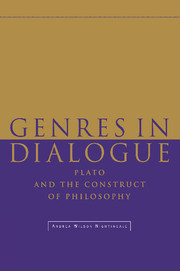Book contents
- Frontmatter
- Contents
- Acknowledgments
- Abbreviations and texts
- Introduction
- 1 Plato, Isocrates, and the property of philosophy
- 2 Use and abuse of Athenian tragedy
- 3 Eulogy, irony, parody
- 4 Alien and authentic discourse
- 5 Philosophy and comedy
- Conclusion
- Bibliography
- General index
- Index of passages from Plato
2 - Use and abuse of Athenian tragedy
Published online by Cambridge University Press: 23 October 2009
- Frontmatter
- Contents
- Acknowledgments
- Abbreviations and texts
- Introduction
- 1 Plato, Isocrates, and the property of philosophy
- 2 Use and abuse of Athenian tragedy
- 3 Eulogy, irony, parody
- 4 Alien and authentic discourse
- 5 Philosophy and comedy
- Conclusion
- Bibliography
- General index
- Index of passages from Plato
Summary
The Platonic dialogue was, as it were, the barge on which the shipwrecked ancient poetry saved herself with all her children: crowded into a narrow space and timidly submitting to the single pilot, Socrates, they now sailed into a new world, which never tires of looking at the fantastic spectacle of this procession. Indeed, Plato has given to all posterity the model of a new art form, the model of the novel – which may be described as an infinitely enhanced Aesopian fable, in which poetry holds the same rank in relation to dialectical philosophy as this same philosophy held for many centuries in relation to theology: namely, the rank of ancilla.
Nietzsche, Birth of TragedyThere is perhaps no more famous formulation in the Platonic corpus than Socrates' assertion in book 10 of the Republic that there is an “ancient quarrel between philosophy and poetry” (607b). But “philosophy” was a discipline that did not have an ancient pedigree: it is Plato who first uses the term to designate a specific intellectual enterprise. In classical Athens, the word “philosophy” signified “intellectual cultivation” in the broad sense. In other words, a wide array of intellectuals – including many poets – were described as practicing “philosophy.”
It is Plato, in fact, who first identifies “poetry” as an arch-enemy of this unfamiliar thing called “philosophy.” As I will argue, Plato's suggestion that there is an “ancient quarrel” between these two genres should not be interpreted as true historical reportage; rather, it is part of a bold rhetorical strategy designed to define philosophy and invest it with a near-timeless status.
- Type
- Chapter
- Information
- Genres in DialoguePlato and the Construct of Philosophy, pp. 60 - 92Publisher: Cambridge University PressPrint publication year: 1995



